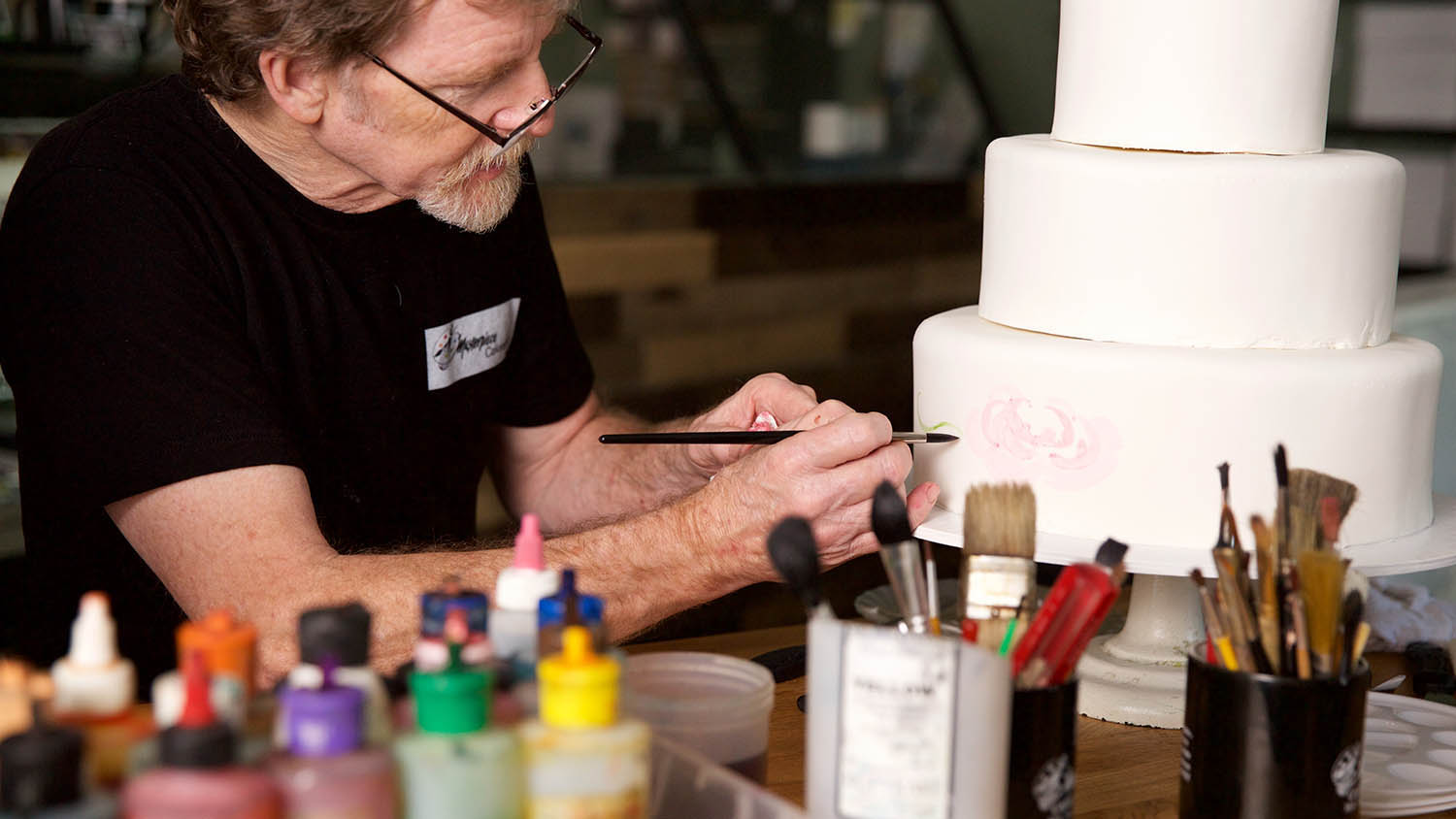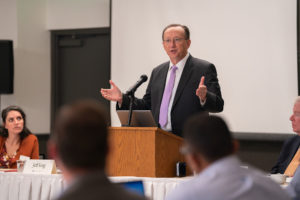
DENVER (BP) – Religious freedom advocates objected to Colorado cake artist Jack Phillips’ court loss in his latest attempt to defend the freedom to conduct his business according to his Christian convictions.
A Denver District Court judge ruled Phillips and his business, Masterpiece Cakeshop, violated Colorado’s Anti-discrimination Act (CADA) by declining to create a cake for a gender transition celebration. After the June 15 release of the decision, Alliance Defending Freedom (ADF), a religious liberty organization that is supporting Phillips in the case, said the ruling would be appealed.
It is the second time in recent years Phillips has been in court for refusing to create a cake because he believed the message communicated by doing so would compromise his faith.
The U.S. Supreme Court delivered an important, though limited, victory to Phillips in the previous case. In a 7-2 opinion in 2018, the high court ruled the Colorado Civil Rights Commission (CCRC) violated the religious free exercise clause of the First Amendment by penalizing Phillips for refusing to design and decorate a cake for the wedding of two men. The justices said the commission demonstrated “religious hostility” toward Phillips – who believes marriage is only between a male and a female – but also indicated it might rule differently in other contexts with similar facts.
In the latest case, District Court Judge A. Bruce Jones ruled Phillips and his shop broke the CADA by denying service based on “sexual orientation.”
“Americans of goodwill can recognize the difference between a sincere disagreement and absurd harassment,” said Brent Leatherwood, vice president of external affairs and chief of staff for the Southern Baptist Ethics & Religious Liberty Commission (ERLC). “Jack Phillips’ free speech and free exercise rights were protected by the Supreme Court in a 7-2 ruling, and it is to the shame of some state authorities that he’s being forced back to court again.”
In written comments, Leatherwood told Baptist Press, “While we are rightly exasperated at this situation, we know that as Christians we cannot grow weary in doing good. We will patiently continue contending for a free public square where the government cannot coerce consciences because that is in the interest of all Americans, no matter what kind of cake they’d bake.”
ADF General Counsel Kristen Waggoner said Phillips “serves all people but shouldn’t be forced to create custom cakes with messages that violate his conscience.”
“Radical activists and government officials are targeting artists like Jack because they won’t promote messages on marriage and sexuality that violate their core convictions,” Waggoner said in a written statement. Legal challenges to Phillips and others represent “a disturbing trend: the weaponization of our justice system to ruin those with whom the activists disagree,” she said.
The cases involving Phillips are among multiple ones in the last several years dealing with the freedom of business owners, especially wedding vendors, to exercise their religious faith by declining to provide services for such events as same-sex ceremonies.
The ERLC filed a friend-of-the-court brief with the Supreme Court in support of Phillips before the 2018 decision.
In the earlier case, Waggoner argued on behalf of Phillips before the Supreme Court. ADF is supporting his defense in the latest one. Lawyers for Phillips in both cases have argued he doesn’t refuse people but messages that contradict his religious beliefs.
Jones, however, decided Phillips – who bases his belief a person cannot transition from one sex to another on biblical teaching – refused Autumn Scardina “goods and services because of her transgender status.” Sacardina, a biological male who reportedly began identifying as a woman in 2010, filed suit against Phillips and his shop in 2019 after he declined to make a pink birthday cake with blue frosting to commemorate the gender transition.
Scardina “need not establish that her transgender status was the ‘sole’ cause of the denial of service. Rather, she need only show that the discriminatory action was based, in whole or in part, on her protected status,” Jones wrote. Masterpiece’s denial of the cake “is inextricably intertwined with the refusal to recognize Ms. Scardina as a woman,” Jones wrote.
Though Phillips and Masterpiece serve gay and transgender customers, the CADA only requires Scardina to show they “refused to provide her goods and services because of her identity – it does not require her to show that [defendants] refuse to provide baked goods to all LGBT [lesbian, gay, bisexual, transgender] individuals in all contexts,” the judge wrote.
Jones rejected arguments the CADA violates Phillips’ First Amendment rights of free speech and free exercise of religion.
“Because CADA does not compel speech, but forbids discriminatory business practices, it does not punish [Phillips and Masterpiece] based on the content or viewpoint of their speech,” Jones wrote.
“The evidence is that [defendants] are engaged in the sale of baked goods to the public and are not ‘primarily engaged in self-expression[.]’”
Regarding religious free exercise, Jones said the CADA “is a neutral law of general applicability.” He distinguished the current case from the previous one in which the Supreme Court ruled the CCRC showed hostility toward Phillips’ faith. “[N]either the CCRC nor the State of Colorado has any involvement in this litigation, which also precludes any claim of selective enforcement,” the judge wrote.
Jones ordered Phillips and his shop to pay Scardina a $500 penalty.
After the ruling, Scardina wrote on Twitter, “I respect religious freedom. It is extremely important and a value we all share. B’day cakes are not about religion or speech.”
During the March trial before Jones, Sean Gates – an ADF-allied lawyer representing Phillips – said Phillips and his wife Debbie decided before they opened the shop in 1993 they were “not going to create cakes with messages that conflict with their faith and the guidebook, the Bible.”
If Phillips baked the cake Scardina requested, “the message would be that he agrees that a gender transition is something to celebrate,” Gates told Jones. “No one should be compelled to celebrate what they don’t believe in.”
Scardina made the request of the Lakewood shop for a cake on the same day in 2017 that the Supreme Court agreed to accept the initial case involving Phillips. The CCRC filed charges the next year against Phillips and Masterpiece in response to a complaint from Scardina. After Phillips sued the state, the commission dropped the charges in 2019.















